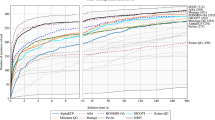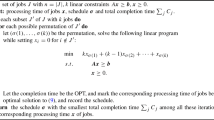Abstract
In this paper, we propose stochastic binary quadratic programs for the scheduling resource allocation process of a wireless orthogonal frequency division multiple access network. More precisely, we formulate a two-stage stochastic model, then we further extend the two-stage model by introducing a knapsack probabilistic constrained approach, and finally we propose a multi-stage stochastic program for this problem. The models are aimed at minimizing the total power consumption of the network at each time slot of the scheduling process subject to user bit rates, sub-carrier and modulation linear constraints. In order to compute lower bounds, we derive linear and semidefinite programming relaxations for each of the proposed models. The bounds are also compared with a basic variable neighborhood search metaheuristic approach. Numerical results show tight lower bounds for the semidefinite relaxations when compared to the linear ones and with the metaheuristic. Moreover, near optimal solutions are found with the semidefinite relaxations for the two-stage model without using probabilistic constraints and for the multi-stage program as well.



Similar content being viewed by others
Notes
\(BER\) stands for bit error rate and measures the number of erroneous bits over all the bits sent through a particular telecommunication channel.
References
Adasme, P., & Lisser, A. (2010). Semidefinite and conic programming for robust wireless OFDMA networks. Electronic Notes in Discrete Mathematics, 36, 1225–1232.
Adasme, P., Lisser, A., & Soto, I. (2011). Robust semidefinite relaxations for a quadratic OFDMA resource allocation scheme. Computers & Operations Research, 38, 1377–1399.
Air Interface for Fixed Broadband Wireless Access Systems. (2003). MAC and additional PHY specifications for 2–11 GHz. IEEE Std. 802.16a.
Amzallag, D., Armarnik, T., Livschitz, M., & Raz, D. (2007). Multi-cell slots allocation in OFDMA systems. In 16th IST mobile and wireless communications summit.
Arora, S., Hazan, E., & Kale, S. (2005). Fast algorithms for approximate semidefinite programming using the multiplicative weights update method. In 46th Annual IEEE Symposium on Foundations of Computer Science (FOCS’05), pp. 339–348.
Berkelaar, A., Gromicho, J. A. S., Kouwenberg, R., & Zhang, S. (2005). A primal-dual decomposition algorithm for multistage stochastic convex programming. Mathematical Programming, 104, 153–177.
Birge, J. (1985). Decomposition and partitioning methods for multistage stochastic linear programs. Operations Research, 33, 989–1007.
Birge, J., & Louveaux, F. (1997). Introduction to stochastic programming. New York: Springer.
Birge, J., & Tang, H. (1993). L-shaped method for two stage problems of stochastic convex programming. Department of Industrial and Operations Engineering : The University of Michigan, Technical Report 93-22.
Birge, J., Donohue, C. J., Holmes, D. F., & Svintsitski, O. G. (1996). A parallel implementation of the nested decomposition algorithm for multistage stochastic linear programs. Mathematical Programming, 75, 327–352.
Borchers, B. (1999). CSDP, A C library for semidefinite programming. Optimization Methods and Software, 11, 613–623.
Cao, Z., Tureli, U., & Liu, P. (2003). Optimum subcarrier assignment for OFDMA uplink. IEEE International Conference on, Communications, pp. 11–15.
Coleri, S., Ergen, M., Puri, A., & Bahai, A. (2002). Channel estimation techniques based on pilot arrangement in OFDM systems. IEEE Transactions on Broadcasting, 48(3), 223–229.
Dimitris, B., & Goyal, V. (2010). On the power of robust solutions in two-stage stochastic and adaptive optimization problems. Mathematics of Operations Research, 35, 284–305.
Escudero, L. F., Garin, M. A., Merino, M., & Pérez, G. (2010). On BFC-MSMIP strategies for scenario cluster partitioning, and twin node family branching selection and bounding for multistage stochastic mixed integer programming. Computers & Operations Research, 37, 738–753.
Fortet, R. (1960). Applications de \(l^{\prime }\)algebre de boole en recherche operationelle. Revue Francaise de Recherche Operationelle, 4, 17–26.
Gaivoronski, A., Lisser, A., Lopez, R., & Hu, X. (2011). Knapsack problem with probability constraints. Journal of Global Optimization, 49, 397–413.
Girici, T., Zhu, C., Agre, J. R., & Ephremides, A. (2010). Proportional fair scheduling algorithm in OFDMA-based wireless systems with QoS constraints. Journal of Communications and Networks, 12(1), 30–42.
Goemans, M. X., & Williamson, D. P. (1995). Improved approximation algorithms for maximum cut and satisfiability problems using semidefinite programming. Journal of the ACM, 42(6), 1115–1145.
Grötschel, M., Lovász, L., & Schrijver, A. (1988). Geometric algorithms and combinatorial optimization (p. 362). Germany: Springer, Berlin.
Helmberg, C. (2000). Semidefinite programming for combinatorial optimization, 150. ZIB-Report ZR-00-34, Konrad-Zuse-Zentrum Berlin, Berlin Germany, October, 2000.
Helmberg, C., Rendl, F., & Weismantel, R. (2000). A semidefinite programming approach to the quadratic knapsack problem. Journal of Combinatorial Optimization, 4, 197–215.
Huang, J., Subramanian, V. G., Agrawal, R., & Berry, R. (2009a). Joint scheduling and resource allocation in uplink OFDM systems for broadband wireless access networks. IEEE Journal on Selected Areas in Communications, 27, 226–234.
Huang, J., Subramanian, V. G., Agrawal, R., & Berry, R. (2009b). Downlink scheduling and resource allocation for OFDM systems. IEEE Transactions on Wireless Communications, 8, 288–296.
Keller, T., & Hanzo, L. (2000). Adaptive multicarrier modulation: A convenient framework for time frequency processing in wireless communications. In Proccedings IEEE, 88, 611–640.
Klein Haneveld, W. K., & van der Vlerk, M. H. (1999). Stochastic integer programming: general models and algorithms. Annals of Operations Research, 85, 39–57.
Kim, I., Lee, H. L., Kim, B., & Lee, Y. H. (2001). On the use of linear programming for dynamic subchannel and bit allocation in multiuser OFDM. In IEEE GLOBECOM 01. Vol., 6, 3648–3652.
Li, W. L., Zhang, Y. J., & Win, M. Z. (2009). Slow adaptive OFDMA via stochastic programming. In IEEE International Conference on Communications ICC ’09, pp. 1–6.
Lisser, A., Lopez, R., & Xu, H. (2009). Stochastic quadratic Knapsack with recourse. In International Network Optimization Conference (INOC-2009), April 2009.
Nikolaos Sahinidis, V. (2004). Optimization under uncertainty: State-of-the-art and opportunities. Computers and Chemical Engineering, 28, 971–983.
Pierre, H., & Mladenovic, N. (2001). Variable neighborhood search: Principles and applications. European Journal of Operational Research, 130, 449–467.
Rüdiger, S., Leen, S., & Van Der Vlerk, M. H. (1996). Two-stage stochastic integer programming: A survey. Statistica Neerlandica, 50, 404–416.
Shapiro, A., Dentcheva, D., & Ruszczyński, A. (2009). Lectures on stochastic programming: Modeling and theory, 436. SIAM Philadelphia, Series on Optimization, Vol. 9 of MPS/SIAM, Philadelphia.
Shen, Z., Andrews, J. G., & Evans, B. L. (2003). Short range wireless channel prediction using local information, signals, systems and computers. In Conference record of the thirty-seventh Asilomar conference on, 1, 1147–1151.
Tarhini, C., & Chahed, T. (2007). On capacity of OFDMA-based IEEE802.16 WiMAX including adaptive modulation and coding (AMC) and inter-cell interference. In 15th IEEE workshop on local and metropolitan area, networks, pp. 139–144.
Wen, Z., Goldfarb, D., & Yin, W. (2010). Alternating direction augmented Lagrangian methods for semidefinite programming. Mathematical Programming Computation, 2, 203–230.
Wireless LAN Medium Access Control (MAC) and Physical Layer (PHY) Specification, IEEE Std. 802.11 (1997).
Wong, I. C., & Evans, B. L. (2009). Optimal resource allocation in the OFDMA downlink with imperfect channel knowledge. IEEE Transactions on Communications, 57(1), 232–241.
Wong, I. C., Zukang, S., Evans, B. L., & Andrews, J. G. (2004). A low complexity algorithm for proportional resource allocation in OFDMA systems. In IEEE Workshop on Signal Processing Systems, pp. 1–6.
Yaghoobi, H. (2004). Scalable OFDMA physical layer in IEEE 802.16 WirelessMAN. Intel Technology Journal, 8(3), 201–212.
Acknowledgments
The author Pablo Adasme is grateful for the financial support given by Conicyt Chilean government through the Insertion project number: 79100020. We are grateful to the referees for their valuable comments to improve this paper.
Author information
Authors and Affiliations
Corresponding author
Rights and permissions
About this article
Cite this article
Adasme, P., Lisser, A. Stochastic and semidefinite optimization for scheduling in orthogonal frequency division multiple access networks. J Sched 17, 445–469 (2014). https://doi.org/10.1007/s10951-013-0333-1
Published:
Issue Date:
DOI: https://doi.org/10.1007/s10951-013-0333-1




